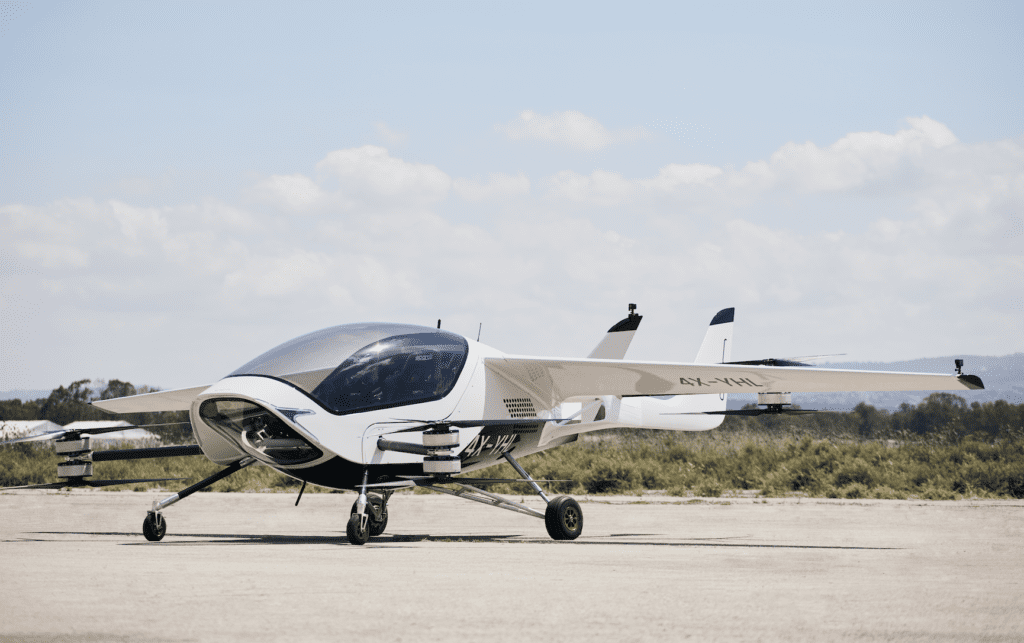
AIR just announced the successful completion of its AIR ONE eVTOL aircraft’s first hover test, which was performed in June. (Photo: AIR)
AIR successfully completed the first hover test of its electric vertical take-off and landing (eVTOL) prototype, according to an announcement from the company this week. The initial flight took place on June 21 in northern Israel, and the AIR ONE aircraft performed multiple hover flight tests over the following two weeks. AIR published a video of the eVTOL aircraft’s hover flight along with the announcement.
AIR’s CEO and co-founder Rani Plaut told Avionics International in an interview that the company has focused on two main objectives: developing a full-scale flying prototype, and creating the mass production unit which will be the basis for certification.
The full-scale prototype program started about 14 months ago, said Plaut. Next, the team will be “expanding within about two months to full-envelope flight testing,” and performing a full range of testing by the end of this year. He added that they expect to put a person inside the aircraft for flight testing in early 2023.
The wingspan of this prototype is about 7.5 meters, or about 24.5 feet. “We have flown things up to 9 meters in wingspan,” Plaut remarked, “but this is the first time we are starting to fly with the full form factor of the product in a configuration that can take two people.” AIR is validating the performance and components with this unit before implementation in the final product. The eVTOL prototype has a take-off weight of 868 kilograms (about 1,900 pounds) and the capacity for 250 kg of payload (about 550 pounds). Its maximum speed will be 155 miles per hour.

The AIR ONE is described as a personal aerial vehicle, targeting customers who want to use an eVTOL for commuting and leisure activities. (Photo: AIR)
Plaut noted that the end product will start flying in the U.S. towards the end of 2023. AIR is working towards certification with the Federal Aviation Administration with this mass production unit, which has already received more than 150 pre-orders. At the beginning of 2022, that number was closer to 50 units.
AIR is building its supply chain and has already signed a few agreements with leading companies. “About 20% to 25% of the components are already assigned to vendors,” according to Plaut. Though he has observed that the number of companies supplying components to eVTOL developers is growing quickly, it is currently a relatively small pool of potential suppliers. The vendors that AIR selects, he said, need to meet not only performance requirements but also supply chain requirements because the company is targeting mass production of units in the thousands.
Flying the AIR ONE prototype was a significant milestone for the company. The next challenge the team is facing is establishing a robust supply chain. Rani Plaut commented that many suppliers have changed, or are in the process of changing, their prices and scope. The problems with the supply chain are, of course, not unique to any one eVTOL developer. “This is a global problem. We are all in the same boat,” he stated.

“It was truly awe-inspiring to watch AIR ONE lift off the ground for the first time. We’ve been on this upward journey for nearly five years and cannot wait for the public to join us on this ride,” said Rani Plaut, CEO and co-founder. (Photo: AIR)
The regulators have been very constructive, Plaut affirmed, and are “actively looking for ways to make it easier, rather than harder.” He added that their strategy of targeting the personal transportation market rather than the commercial route, which most eVTOL companies are pursuing, has made things somewhat easier. AIR will still face some hurdles related to certification, but in general, there will be fewer hoops to jump through on the private route.
“Putting something in the sky—it’s just the beginning of a solution,” Plaut said. “Once you have a commercial solution, you need to start a company which cannot start operating unless it solves the whole formula. You need airways, places to land; it is a much more structured solution.”
A differentiating factor of the AIR ONE is that it is aimed at making eVTOL flight accessible to a wide range of people. It is intended to be used for commuting or leisure activities. “Of course, a pilot license is required, but we are aiming for a very low level of training,” Plaut told Avionics in January during an interview. He explained that the aircraft will be extremely simple to operate, with minimal training required.